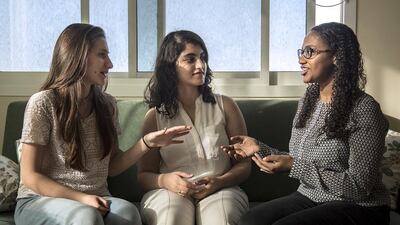DUBAI // The future of thousands of young people from Muslim countries at universities and colleges in the United States has been thrown into doubt by Donald Trump’s travel ban.
More than 16,000 students from the seven banned countries are affected by the president’s executive order: 11,338 from Iran, 1,727 from Iraq, 1,578 from Libya, 792 from Syria, 516 from Yemen, 233 from Sudan and 32 from Somalia.
The students are effectively confined to the US. If they leave to visit their home countries or anywhere else, they would be unable to return to the US to resume their studies.
“For now, it is a temporary ban but even when it is lifted, the visa process can be expected to be all the more lengthy and complicated,” said Dr Kamran Bokhari, senior fellow with the Centre for Global Policy in Washington.
Amin Amouhadi, 32, from Iran, studies at the University of Georgia. His girlfriend, also Iranian, is about to finish her PhD in Canada.
“We were planning to get married in a month and move in together but the current ban and its possible consequences have put the future of all our plans in jeopardy,” Amin said.
“I might quit my PhD programme, and try to find a university in Canada to apply for. I can’t think of any other plan.”
The travel ban also has implications for young people in the UAE and elsewhere who dream of studying in the US.
Suzan Monzer from Syria, Zena Shamkhy from Iraq and Sara Khalil from Sudan, all aged 16 and pupils at Cambridge High School Abu Dhabi, want to study for degrees in biology and eventually medicine at American universities. Instead of pursuing their dreams, they are left feeling lost.
“We were opting for America not just because of the quality of education but also because we heard lots of good stories about the multicultural and tolerant American society. But I have lost hope in America,” said Sara, who wants to enter medical school and is in the process of applying to universities.
“I have visited Sudan only a few times in my whole life. Yet I can be a ‘potential threat’ to the USA. It’s so absurd.”
Sara, who was brought up in the UAE, is now looking at universities in Canada.
Zena was also shocked. “We have become the victims of circumstances. Just because we have a passport of a country that is not liked by one person, we have to pay the price,” she said. “I am so disappointed. The world is giving us limited options.”
Zena, who was also born and brought up in UAE, is now opting for Australian universities to study for a degree in biochemistry.
“But I am not confident. We are losing confidence in the so-called western democratic countries about which we heard lots of great stories since our childhood. It seems that the only option left for me is to get another passport. But even then my identity as Iraqi will continue to be part of my personality, of which I feel proud,” she said.
Suzan moved to the UAE with her family from Aleppo, Syria, when she was 4, and she dreamt of attending Harvard.
“My dreams have been shattered because of my nationality. It is such a painful feeling. I am not just sad, I am angry,” she said.
“My family cannot afford expensive education but I knew because I am a bright student, I will get the scholarship at Harvard. Also, I was told that American universities give extra consideration to students who had a difficult background, but it is not true.”
Ohannes Ohannes, 18, an Iraqi student in Dubai, had been planning to study economics in the US, where his grandmother and other family members live.
“I left Iraq in 2004 because of the American invasion and I feel like I have been displaced again now,” he said.
“Having visited the US several times to celebrate the festive season with my family, I feel like this has been taken from me. Just because I was born in Baghdad, I no longer have the ability to go see my grandma, uncles, aunts and cousins.”
Last year there were 89,952 students from 21 Arab countries studying in the US, from a total of 974,926 international students in the country.
akhaishgi@thenational.ae
* Additional reporting by Reuters

